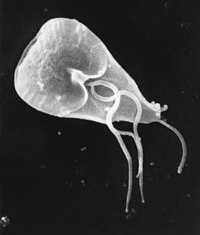
Photo from wikipedia
Infection with Giardia produces a wide range of clinical outcomes. Acutely infected patients may have no overt symptoms or suffer from severe cramps, diarrhea, nausea and even urticaria. Recently, post-infectious… Click to show full abstract
Infection with Giardia produces a wide range of clinical outcomes. Acutely infected patients may have no overt symptoms or suffer from severe cramps, diarrhea, nausea and even urticaria. Recently, post-infectious irritable bowel syndrome and chronic fatigue syndrome have been identified as long-term sequelae of giardiasis. Frequently, recurrent and chronic Giardia infection is considered a major contributor to stunting in children from low and middle income countries. Perhaps the most unusual outcome of infection with Giardia is the apparent reduced risk of developing moderate-to-severe diarrhea due to other enteric infections which has been noted in several recent studies. The goal of understanding immune responses against Giardia is therefore to identify protective mechanisms which could become targets for vaccine development, but also to identify mechanisms whereby infections lead to these other diverse outcomes. Giardia induces a robust adaptive immune response in both humans and animals. It has been known for many years that there is production of large amounts of parasite-specific IgA following infection and that CD4+ T cell responses contribute to this IgA production and control of the infection. In the past decade, there have been advances in our understanding of the non-antibody effector mechanisms used by the host to fight Giardia infections, in particular the importance of the cytokine interleukin (IL)-17 in orchestrating these responses. There have also been major advances in understanding how the innate response to Giardia infection is initiated and how it contributes to the development of adaptive immunity. Finally, there here have been significant increases in our knowledge of how the resident microbial community influences the immune response and how these responses contribute to the development of some of the symptoms of giardiasis. In this article, we will focus on data generated in the last 10 years and how it has advanced our knowledge about this important parasitic disease.
Journal Title: Advances in parasitology
Year Published: 2019
Link to full text (if available)
Share on Social Media: Sign Up to like & get
recommendations!